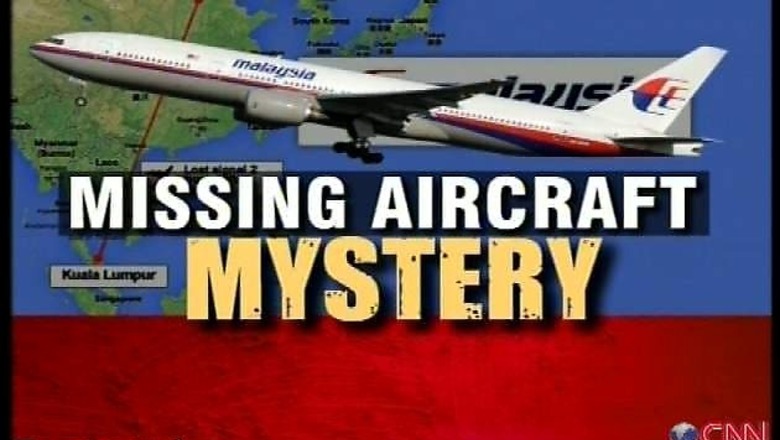
views
Kuala Lumpur/Perth: Two weeks after a Malaysia Airlines airliner went missing with 239 people on board, officials are bracing for the "long haul" as searches by more than two dozen countries turn up little but frustration and fresh questions.
The international team hunting Flight MH370 in the remote southern Indian Ocean returned on Saturday to an area where suspected debris was spotted by satellite earlier this week.
Six aircraft and two merchant ships are scouring the area, though Australian officials have cautioned the objects, one up to 24 metres (72 feet) in length, may not be related to the missing aircraft or might have sunk.
China, Japan and India are sending planes and Australian and Chinese navy vessels are steaming to the zone, more than 2,000km (1,200 miles) southwest of Perth.
"Weather conditions in the search area are good, with 10 km (six miles) of visibility," said Australian Maritime Safety Authority Sam Cardwell.
Aircraft and ships have also renewed the search in the Andaman Sea between India and Thailand, going over areas that have already been exhaustively swept to find some clue to unlock one of the biggest mysteries in modern aviation.
Malaysian officials have been realistic about their ability to lead the operation with a global dynamic that some have said is beyond the country's technical capabilities and expertise.
"This continues to be a multinational effort coordinated by Malaysia, involving dozens of countries from around the world," Malaysian Defence Minister Hishammuddin Hussein said at a briefing on Friday.
Malaysia welcomed "all assistance to continue to follow all credible leads", said Hishammuddin, who is also acting transport minister.
He said searchers were facing the "long haul" but were conscious that the clock was ticking. The plane's "black box" voice and data recorder only transmits an electronic signal for about 30 days before its battery dies, after which it will be far more difficult to locate.
Investigators suspect the Boeing 777, which took off from Kuala Lumpur for Beijing shortly after midnight on March 8, was deliberately diverted thousands of miles from its scheduled path. They say they are focusing on hijacking or sabotage but have not ruled out technical problems.
The search itself has strained ties between China and Malaysia, with Beijing repeatedly leaning on the Southeast Asian nation to step up its hunt and do a better job at looking after the relatives of the Chinese passengers.
Hishammuddin has rejected complaints that the country has botched search efforts or refused to share vital information with other governments.
For families of the passengers, the process has proved to be an emotionally wrenching battle to elicit information, their angst fuelled by a steady stream of speculation and false leads.
In a Beijing hotel where the bulk of Chinese families have been awaiting information, the deadlock prompted rage over perceived Malaysian incompetence.
For a handful of Chinese families who chose to be flown to Kuala Lumpur to be closer to the heart of search operations, the flow of information has been no more fluid.
On Wednesday, grief erupted into anger when several family members unfurled a protest banner in front of a throng of journalists, demanding the truth from the Malaysian government. The ruckus prompted police to escort the relatives, including a distraught mother, away from the briefing room.
By Friday, the Chinese families who had been staying at a resort south of Kuala Lumpur had to decamp to another hotel as they were displaced by customers for the upcoming Malaysian Formula One grand prix.
"Tonight all the government could give us was old information. But of course we, the families, want to hear new updates," Malaysian Hamid Ramlat, the father of a passenger, told reporters after emerging from a briefing on Thursday night.
Some experts have argued that the reluctance to share sensitive radar data and capabilities in a region fraught with suspicion amid China's military rise and territorial disputes may have hampered the search.
Two people familiar with the investigation said the search had been slowed in some cases by delays over the paperwork needed to allow foreign maritime surveillance aircraft into territorial waters without a formal diplomatic request.
Australia's Deputy Prime Minister Warren Truss said on Friday he was grateful for the search craft offered by China and others.
Australian rescue coordinators are awaiting confirmation of the planes and ships offered before they are included in any search schedules, AMSA's Cardwell said.

















Comments
0 comment